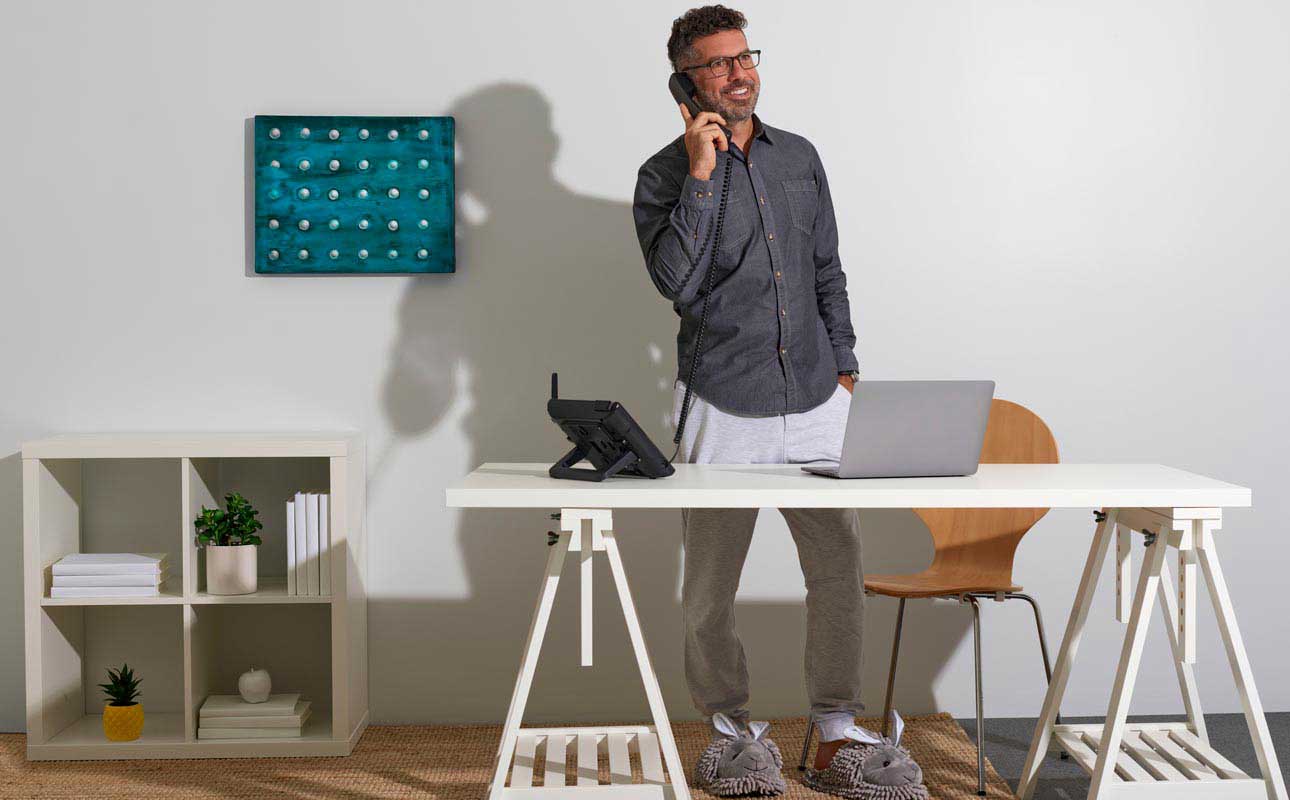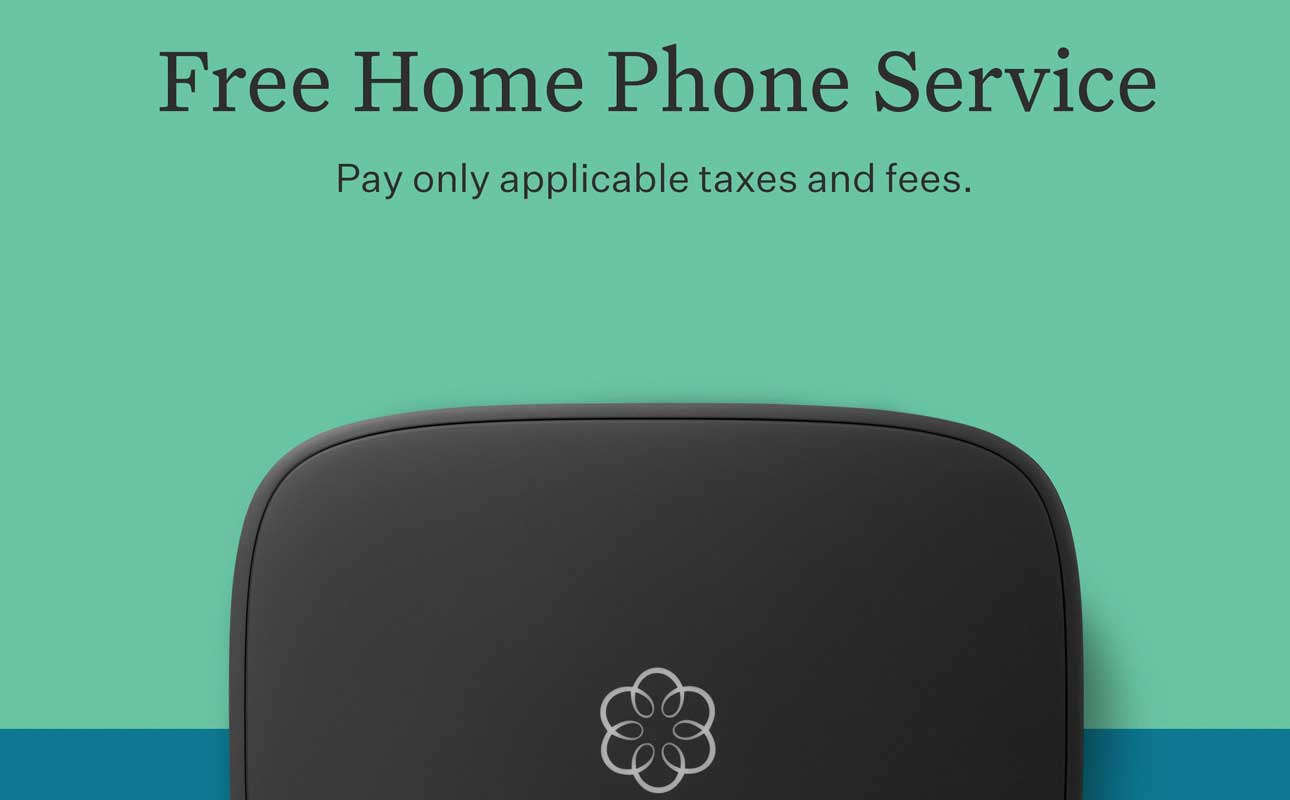
VoIP: Best landline alternative for home phone
Questions? Call 877-629-2923.
Looking for a new type of home phone service? You’re not alone. As monthly phone bills continue to rise and reliability declines, traditional phone service customers are searching for options.
VoIP home phone service might be just the ticket. Keep reading to learn about VoIP and see how it stacks up against traditional landlines. We’ll highlight the most important things to look for in a VoIP provider, explain the process of moving to a VoIP-based phone service, and answer some frequently asked questions about making the switch.
Table of Contents
1. What is residential VoIP?
See what you can do with a VoIP service and why you might want to make the switch.
2. How it works: VoIP vs. landline
Learn how VoIP differs from a landline service in how it transmits voice data.
3. Pros and cons of switching from a landline service
Check out the many benefits VoIP has to offer and learn how to offset the drawbacks.
4. How to switch from a landline to VoIP
Explore the four simple steps to making the switch from a landline to VoIP.
5. What to look for in a VoIP phone service provider
Learn how to choose a high-quality, reliable VoIP provider to ensure you’re happy with the service.
6. VoIP frequently asked questions
Get answers to the most common questions we receive about VoIP as the alternative landline.
1. What is residential VoIP?

Voice over Internet Protocol (VoIP) is a technology that allows you to place phone calls through an internet connection, rather than through the twisted-pair copper-wire phone lines that have been around for nearly 150 years. With VoIP, you can place calls to anyone, anywhere, just like you would with a traditional home phone.
You have several options for using this internet-powered phone service, including using a VoIP-enabled phone or hooking up a regular phone to a digital adapter. You can also make calls directly from your laptop or desktop. And if you want to keep your home phone number while enjoying the benefits of the latest technology, VoIP is an excellent alternative to a landline.
2. How it works: VoIP vs. landline
How the voice data is transmitted between callers is very different between VoIP and landline services. With a traditional landline, your voice data travels through a network of interconnected, physical phone lines to be received by the person you’re calling.
With VoIP, your voice is converted into small packets of digital data and transmitted through your home internet connection. Then those data packets are seamlessly translated back into voice data in near real-time, resulting in clear, crisp voice quality for the person you’re calling.
3. Pros and cons of switching from a landline phone service to VoIP.

VoIP is popular for many reasons. Besides offering unique features like sending voice messages to your email, it also has significantly lower monthly costs than traditional landline service. But there are a few drawbacks that you’ll need to consider and address when you switch to VoIP.
VoIP pros
Ease of installation.
Making the switch to a VoIP home phone system is easy. Setup involves creating an account with a provider, choosing a home phone number or keeping your current number, and registering your 911 location. Plug your base station into your wireless router, connect the phone into the base station, and power up the system — it’s as simple as it sounds!
No- or low-cost monthly service plans.
VoIP often represents significant cost savings compared to a traditional landline. Some VoIP providers don’t charge a monthly fee at all for a base service plan. (With Ooma, after purchasing a Telo VoIP base station, you can use our Basic service for free, plus applicable monthly taxes and fees.)
Low-cost unlimited international calling.
For those with family members and friends in other countries, the cost of staying connected via a traditional landline can add up quickly. In contrast, international calling rates from VoIP providers are usually significantly less expensive. Some VoIP providers like Ooma even offer unlimited international calling plans at significant cost savings. You can talk with friends and family in other countries as much as you like without worrying about per-minute charges. If you make frequent international calls, a VoIP service is an attractive landline alternative.
Take and make calls from anywhere.
Mobile devices and laptop computers have transformed how and where people communicate. Using VoIP, you no longer need to be at home to take a call. VoIP gives you the flexibility to take and make calls from your home phone number on a range of devices, including your computer, smartphone, or tablet. It’s as easy as downloading your provider’s app.
Advanced telemarketing and spam call blocking.
One of the leading reasons people drop their home phone service is the never-ending stream of unwanted calls from telemarketers and spammers. VoIP can dramatically reduce the volume of unsolicited calls. These calls are blocked in real-time by comparing all incoming calls to a database of millions of numbers used by telemarketers and spammers before your phone even rings.
VoIP cons
Internet-dependent call quality.
Since VoIP phones rely on the internet to send and receive voice data, a slow internet connection can result in poor voice quality. As broadband speeds improve nationwide, voice quality is becoming less and less of an issue for VoIP home phone users. But you’ll want to be sure to prevent this problem by choosing a reliable high-speed internet service.
VoIP phones won’t work without power.
If your home loses electrical power, your VoIP system won’t work. An easy workaround is to plug your system into an Uninterrupted Power Supply (UPS). A UPS is a type of battery backup for electronics. (In fact, it’s not a bad idea to use one of these to power your Wi-Fi router and home PC, too.) The Ooma Telo Battery Backup is designed specifically to ensure your phone service stays up and running even when the power is out. Ooma also gives you the option to automatically route all incoming calls to your mobile number during a power outage.
911 requirements.
In the early days of VoIP, home phone providers didn’t always register location data to ensure that 911 calls were routed to the correct local dispatch. Times have changed, however, so this is no longer a concern. VoIP providers now ask for your emergency contact and home address details as part of the service setup process, ensuring 911 calls get routed to the correct place in the event of any emergency. But it’s important to note that you must register your new address with your VoIP provider for accurate 911 location if you move.
Calculate your savings
See how much you can save with Ooma by entering your current phone bill.
Go to Savings Calculator4. How to switch from a landline phone service to VoIP.
Switching from landline service to VoIP is a simple, straightforward process. Although providers may have different workflows, these steps should be similar:
1. Test your internet connection speed.
Since VoIP calls use your home internet connection, start by doing a quick speed test. For VoIP service to work well, you’ll need a high-speed connection running at least 384 kbps both when sending data upstream and receiving data downstream.
2. Select a VoIP service provider.
Once you know that your internet connection is fast enough to support a residential VoIP service, it’s time to choose a company to work with. We’ll get into the specifics of what to look for in a provider in the next section.
3. Get the right equipment.
All VoIP home phones require a base station that plugs into your router. From there, you can choose to purchase a VoIP phone or just plug your existing home phone right into the base station and use it like you did when you had a landline service.
4. Keep your home phone number.
Keeping your existing landline home phone number is a straightforward process. It’s possible to transfer any U.S.-based number. The process, also known as porting, varies a bit by provider, but you can expect to have your old number working on your new system within a few weeks. Do not cancel your current service until your number is transferred to your new provider.
Of course, if you’d prefer a new home phone number, most providers will allow you to select one for free when you sign up for service.
5. What to look for in a VoIP phone service provider.

Not all residential VoIP services are created equal, and your satisfaction with your VoIP service will depend on the provider you choose. Here’s what to look for to ensure you make a decision you’ll be happy with and be sure to read our post on the best VoIP services for home.
Reputation
Some residential VoIP providers are standouts for their commitment to providing good service at a fair price. One of the easiest ways to research a company’s reputation is by looking at its online reviews. Reading about the experiences of happy (and not-so-happy) customers can give you a better feel for the level of service you can expect.
Customer support
As you consider VoIP as an alternative to your landline and then go through the process of making the switch, you’re bound to have questions. The best providers have multiple ways to get answers when you need them. Look for live chat, phone support, and an easy-to-navigate website.
Advanced features
One of the big perks of VoIP is access to modern call features like advanced call blocking, smart home integration, and the ability to make and receive calls from your home number using your mobile phone. Be sure the provider you’re considering offers the features you want.
Low or no-cost monthly plan options
Many VoIP providers offer free or nearly-free plan options. These choices can be a good fit for some, but they typically don’t include many advanced features that make VoIP phone service so attractive. The best residential VoIP providers offer a robust list of calling features for a low monthly fee, so be sure to look at what’s included at each price tier.
No contracts
Monthly service contracts are a thing of the past for home phone service. Getting locked into a long-term commitment is completely avoidable since several high-quality residential VoIP providers (including Ooma) allow you to go month-to-month.
6. VoIP frequently asked questions

Want to learn more? Here are answers to common questions about switching to VoIP.
Is VoIP a good landline alternative?
For many people, VoIP is an excellent alternative to a landline phone service. It’s inexpensive, comes with low-cost international calling plans, and includes a range of valuable features like advanced call blocking and the convenience of making and receiving calls via your home number using your mobile devices and computer.
Can I keep my home phone number?
Absolutely. All home phone numbers in the U.S. can be transferred from your landline phone service to a residential VoIP system.
Can I use my old landline phone with VoIP?
Yes, VoIP systems include a base station that plugs into your home internet router, so you can connect VoIP to landline phone to the base station. If you plan on using your old home phone unit, simply plug it into the base station to begin making and receiving calls.
Do I need extra equipment to switch to VoIP service?
Most residential VoIP providers allow you to continue using your old home phones, so the only equipment you need is a base station to connect to your internet.
Can I call internationally?
Yes, low-cost international calling is one of the biggest benefits of switching to a VoIP service. If you have friends and family living abroad, connecting with your loved ones will be easier than ever.
Is VoIP secure?
Both landline and VoIP phone services are susceptible to hacking, but the best VoIP service providers have security protocols in place to secure VoIP.
VoIP is a landline alternative with plenty of benefits
A VoIP home service is an attractive landline alternative, offering the best of modern technology with the advantage of having a home phone number at a cost savings. The benefits are many, while you can easily address the cons with the right provider.

Explore Ooma’s VoIP home phone options and get crystal-clear calls with a free or low-cost premium service.
See what’s included

